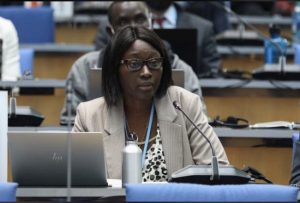In a reaction to the outcome of COP28 arrived at in Dubai on Wednesday, December 13, 2023, Madeleine Diouf Sarr, Chair of the Least Developed Countries (LDC) Group, has said that the summit’s conclusion is imperfect as the group expected more.

According to her, the outcome reflects the very lowest possible ambition that LDC Group could accept “rather than what we know, according to the best available science, is necessary to urgently address the climate crisis”.
In a statement made available to EnviroNews, she said: “We have taken stock of progress in implementing the Paris Agreement, and seen the world is well off track. The Dubai decision is historic in including the first reference to fossil fuels, but we are concerned about the loopholes that it leaves open, which could limit true emissions reductions and ambition.
“Limiting warming to 1.5C is a matter of survival, and international cooperation remains key to ensuring it. Alignment with 1.5C not only requires countries to urgently reduce domestic emissions but also the delivery of significant climate finance so that we can continue our leadership in going well beyond our fair share of the global effort when it comes to reducing emissions.
“There is recognition in this text of the trillions of dollars needed to address climate change in our countries. The GST highlights the vast gap between developing country needs and the finance available, as well as underscoring rapidly dwindling fiscal space due to the debt crisis. Yet it fails to deliver a credible response to this challenge.
“Next year will be critical in deciding the new climate finance goal, which must be informed by this global stocktake, and must close the vast gaps that have been identified. To respond to the GST, the new goal must reflect the full needs of our countries to address climate change, including the costs to mitigate, to adapt, and to address loss and damage.”
On the Global Goal on Adaptation, Ms Sarr said: “Our Group has worked tirelessly over the last two years and constantly advocated for a robust Framework that serves people, livelihoods and ecosystems. Today’s outcome is full of eloquent language but regrettably devoid of actionable commitments.
“Our communities deserve more than aspirational goals; they need real, immediate, and impactful support to adapt to the realities of climate change. The adoption of the GGA Framework at COP28 is a historic achievement, however, our work is far from over. We must now focus on the critical next steps, which include the development of indicators, to ensure the framework’s progress is accurately tracked and measured.”
